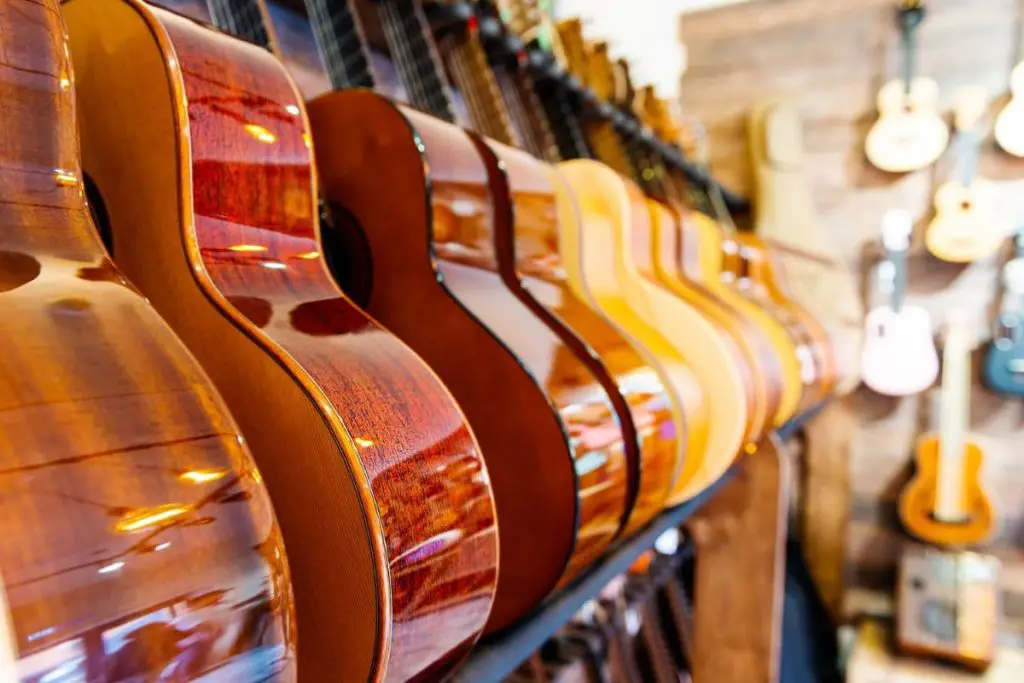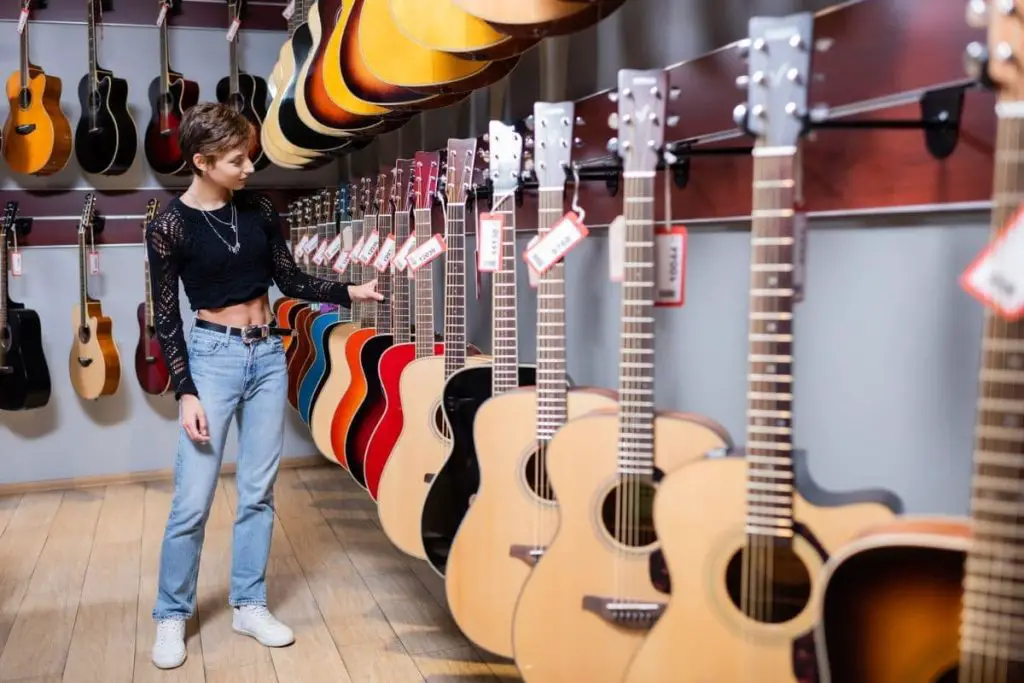While it’s definitely possible to get an inexpensive guitar that gets the job done, especially as a beginner, high-quality acoustic guitars mostly tend to be expensive. This fact is particularly true for acoustic guitars that are geared towards highly-skilled seasoned musicians. Some price tags might be baffling for someone who’s just getting familiar with the acoustic guitar world, so you’ll probably wonder why quality acoustic guitars are so expensive.
Quality acoustic guitars are expensive because they are made from rare tonewood, require a lot of knowledge and skill to make, and their production is usually not outsourced. The brand name also plays a big role, as a popular brand name can greatly inflate the price.
This article will explain all the influences that affect the high price tags of quality acoustic guitars. We’ll also go over the sound differences between cheap and expensive acoustic guitars and discuss whether buying an expensive guitar is even worth it.
If you want to find out what my recommended guitar gear is, then here is what I recommend on Amazon:
- Fender Cutaway Acoustic-Electric Guitar Bundle (MY FAVORITE GUITAR)
- Snark SN-8 Super Tight All Instrument Tuner (Easiest Tuner I’ve Used)
- 6 String Acoustic Guitar Capo (Best CAPO for quick changes)
- Dunlop Max Grip 1.0mm Nylon Picks (Thick Guitar Pick So You Don’t Lose Grip!)
- Universal Guitar Stand (Cheap & Minimalist Guitar Stand I Recommend)
- Levy’s 2″ Wide Quick Adjust Guitar Strap (Best Guitar Strap For Any Level)

1. Tonewoods Are Not Cheap
You can’t just take any piece of wood and use it to make a guitar. I mean, you could do that, but the results probably wouldn’t be anything to write home about. The types of wood used for acoustic guitars are carefully chosen because of their acoustic properties.
We call these woods tonewoods. Luthiers choose them because of the following properties.
- Hardness: This refers to how hard the wood is, literally speaking. Hardness accentuates higher frequencies, so a guitar made from harder wood will typically have a higher sound.
- Flexible strength: Stronger and more flexible wood receives more energy from the strings. This makes it produce a wider dynamic range, along with more volume, clarity, and projection.
- Density: The density of the wood determines how the energy from the strings is absorbed. Dense wood absorbs less energy, particularly above the mid-range, which results in more influence from the wood. Less dense wood absorbs more energy, which gives a warmer and better balanced mid-range.
More than anything else, tonewood is important because of its resonance. In simple words, resonance refers to how well the guitar top vibrates when the strings are plucked. Wood that’s too stiff won’t vibrate well enough, but wood that’s not sturdy enough will degrade over time, leading to lower sound quality.
High-quality tonewoods are increasingly hard to come by. In some cases, it can be difficult to find lower-quality tonewoods. But if you’re looking to build an acoustic guitar that’s as good as money can buy, you want the best of the best.
The best of the best tonewoods are scarce. As we all know, scarcity inflates prices, which means that guitars are more expensive for the manufacturers to produce. This eventually adds to the price you pay at checkout because otherwise, guitar manufacturers would lose money.
Indian rosewood is a good example of this. This wood has been used for quite a long time in guitar production. Luthiers make fretboards, sides, and backs from it, for example. It is common on high-end acoustic guitars because of its amazing performance.
However, its use has been heavily regulated, meaning it’s much more difficult to import enough of it. Therefore, it has become scarce, and thus expensive. Cheaper alternatives exist, but they don’t get the job done so well.
Scarcity becomes an even bigger problem when it comes to old-growth wood. This is wood from forests that haven’t been harvested for at least one hundred years. Such forests are not so common, so their wood is incredibly rare.
However, it’s questionable whether this has a noticeable influence on a guitar’s tone. This might be more of a way to hike up the price of a guitar rather than to affect its sound in any meaningful way.
Some companies like Martin are also dedicated to sourcing their wood ethically and sustainably. While this is surely commendable, it makes scarce materials even scarcer. This is one of the factors that lead to their dizzyingly high prices.

2. Guitars Are Not Made Easily
Building a high-quality guitar takes rare skills and years of experience. This is particularly true for handmade guitars, and most of the super-expensive guitars you see are not mass produced, but handmade instead.
A luthier with decades of experience will have experience and knowledge that’s hard to put a price tag on. The instrument you’ll get from such a craftsman will probably be unmatched by most other things you’ll ever play. Since their skills are rare, and each instrument they make is unique, those instruments will naturally come at a steep price.
With a handmade guitar, you’ll probably get a guitar made specifically for you and strictly according to your needs and preferences. No matter what product is in question, such services don’t come cheap.
While the skills luthiers have are rare, and their guitars are thus much more expensive for that reason, this doesn’t mean that factory-made guitars are made cheaply. Even the workers who mass-produce guitars have skills that are not super common, so they have to be paid accordingly, at least ideally.
Even though CNC machines have drastically sped up and simplified the process of guitar making, we still can’t build a guitar overnight. Plus, the workers who operate those machines are always in demand, and manufacturers have to try to keep them in their companies. Not to mention there are also workers who put guitars together, which also takes time, effort, patience, and precision.
Therefore, building a guitar is never easy, regardless of the method used, and this will always be reflected in the price. This is even more true for high-quality guitars that demand a lot of attention to detail and strict quality control.

3. High-Quality Guitars Are Not Outsourced
As we’ve seen, labor costs are one of the most significant factors that increase the prices of guitars (and all goods, for that matter). This has prompted many guitar manufacturers to move their production facilities to China and other countries with cheap labor and lax labor laws.
Sometimes, manufacturers simply do this to increase their profit margins by lowering their costs and keeping more or less the same prices. In other cases, the prices go down as well, creating affordable instruments which are often marketed toward beginners and casual players.
Instruments whose production is outsourced are not necessarily bad. There are many instruments made in East Asian countries that come at affordable prices, but provide guitarists with a more than satisfying tone, especially for the standards of beginners.
However, cutting down on labor costs usually means that the quality of guitars with outsourced production won’t be top-notch. You might get a good guitar this way, but you’ll never get an elite-level guitar.
Top-notch guitars are usually not made in countries with cheap labor, but rather in the USA and other countries where manufacturers can get highly skilled and experienced luthiers. This helps them create high-grade instruments but also makes the production much more expensive.
Attracting fine craftsmen is not cheap, and it’s also not cheap to make them stay in your company. When you add that to the high costs of the raw materials necessary for guitars, you’ve got a recipe for very steep prices.
4. Brand Names Inflate the Prices
In every industry, a product from a well-known and established brand will cost significantly more than a product from an up-and-coming brand. This often doesn’t have much to do with the actual product. You might have two identical products, but if one is marked with a tag from a high-end brand, it will cost significantly more.
The same problem exists in the world of guitars. A guitar from an established brand such as Gibson or Fender will cost much more than a guitar from a lesser-known brand such as Harley-Benton.
Quite often, the price tag on a Gibson or Fender will come only or mostly because of the Gibson or Fender logo slapped on the headstock. This is particularly true for newer models. You’ll often find guitars from lesser-known brands that are almost exactly the same as the ones from the big-name brands at a fraction of the price. This is simply because they lack the high-end logo on the headstock.
Of course, this doesn’t mean that the big names put steep price tags on their guitars only because of their reputation. They have decades of experience and tried and tested methods of guitar production. Plus, they’ve stood the test of time, and that has to mean something.
However, they sometimes tarnish their reputation by delivering subpar products at the same price. Gibson has come under a lot of fire in recent years for producing guitars of inferior quality at the same price as before. This made many guitarists turn away from them and look for cheaper alternatives.
While a popular brand name can stand for quality and reliability, it doesn’t have to. Just because there’s a Fender logo on a guitar, doesn’t mean that it will be superior to all other guitars you can play. You don’t have to spend your life savings on a guitar to get a good tone.

5. High-End Guitars Are Built To Last
Unlike when you purchase a cheap guitar, you can rest assured you’ll get long use out of a high-end guitar. Those instruments are built to last a long time, and if you take reasonably good care of them, it will take generations until they become unplayable.
The high-quality wood and craftsmanship will ensure that the guitar stays in one part for decades. A good guitar will likely get an even better sound with years, so your investment will only become more valuable.
As with anything else, a long lifespan comes at a steep price. As we’ve said, the materials and labor needed for such an instrument are not cheap. In addition to that, the manufacturers will want to increase their profits. If you’ll only ever buy one guitar from them, they’ll try to extract as much money from you as possible.
However, this might be a good deal for you. Even though you might pay a lot of money up front, you’ll be set for life and won’t have to worry about buying a guitar ever again. Plus, if you ever wish to sell it, a well-kept, high-quality acoustic guitar won’t lose much of its value, so you can get decent money for it.
In fact, its value may even go up because of its vintage appeal. Vintage guitars are usually not very cheap, and their value comes precisely from their age and the unique sound that they bring. You’ll often see people pay ridiculous prices for guitars from the sixties or seventies. One day, you might be the lucky recipient of a ridiculous amount of money for a guitar.
Does an Expensive Acoustic Guitar Sound Better?
Expensive acoustic guitars typically sound better. The better material, craftsmanship, and greater attention to detail will undoubtedly make for a better-sounding guitar. There are rare cases where the price of a guitar has been needlessly inflated, but that’s not what happens most of the time.
However, there is a point of diminishing returns with guitars, just like with most other things. While a $1,000 guitar will sound drastically better than a $200 guitar, it’s questionable whether a $10,000 guitar sounds noticeably better than a $5,000 guitar.
While the most expensive guitars are usually made by the best luthiers, from rare and unique wood, the question is how much that translates to the sound. While tiny differences exist, nobody but the best-trained musicians will be able to hear those differences.
Is it really worth it buying the most expensive guitar one can find? In most cases, it’s not. Unless you’re a collector or an extremely gifted guitarist, you probably won’t get anything out of it apart from bragging rights. Yes, bragging rights are cool, but they’re not worth spending $10,000 on a Martin guitar.
For most people, there probably isn’t much point in spending more than $2,000 or $3,000 on a guitar. Even if you can afford to pay that much money, you probably don’t need to. The average guitarist would be much better off spending up to $1,000 on a guitar, and between $500 and $1,000 on a guitar amp. That is, if you’re an electric guitar player.
Even if you have the best guitar ever, it will still sound terrible if you plug it into a terrible amp. Not to mention that there is no need to spend thousands upon thousands of dollars on gear if you’re just a hobbyist.

Do You Need an Expensive Acoustic Guitar?
As a beginner, you do not need an expensive guitar, whether acoustic or electric. Of course, you shouldn’t buy the cheapest possible guitar, but anything that sounds reasonably good will get the job done.
The most important thing is to practice regularly and sharpen your technique. Even if you get the best guitar money can buy, you won’t be able to use it to the fullest without the right set of skills. On the other hand, even a bad guitar can sound amazing if played by a good guitarist.
Just check out this video of Zakk Wylde playing a Hello Kitty Guitar to see what I mean.
Now, this is not the best Zakk has ever sounded, but that guitar sounds much better than you’d expect from something that is basically a toy. It wouldn’t sound that way if Zakk wasn’t a highly skilled guitarist.
Once your guitar skills develop, you can consider investing in a better guitar. Again, your guitar should match your skill set. You shouldn’t jump from a beginner guitar to a luxury one. However, getting a better ax will make your skills stand out better.
If you keep improving, you can consider getting an even better guitar, and so on. You can upgrade your gear every couple of years if you feel a new, more expensive instrument will benefit your playing.
However, you can’t, and you shouldn’t do this indefinitely. So, assess your needs and see if it’s really worth upgrading above the $1,000-dollar tier. If you’re a hobbyist and only play for fun, there is probably no need.
Even if you play gigs here and there and earn a little bit of money that way, it’s still probably not worth it. Unless you become a serious professional musician, it probably makes more sense to start investing your money in something else after a certain point.
Final Thoughts On Why Acoustic Guitars Are So Expensive
Acoustic guitars tend to get expensive because of the materials needed for them, and the craftsmanship that goes into making them. Brand names and age also drive prices up, as vintage instruments from well-established manufacturers are extremely popular, and the supply is low.
As a beginner, you don’t need to get an expensive guitar. Work on honing your skills and try to get as good as possible at playing your instrument. Upgrade when you feel that it’s necessary, but don’t go overboard.
Here are some common questions related to how expensive acoustic guitars are.
Why Are Acoustic Guitars More Expensive Than Electric Guitars?
Acoustic guitars are often more expensive than electric guitars due to the differences in the materials, construction, and production processes involved.
Firstly, acoustic guitars require higher quality materials such as solid wood for the top, back, and sides of the instrument, which can be more expensive than the materials used in electric guitars. These woods need to be carefully selected and dried to ensure the best sound quality and resonance.
Secondly, the construction process for acoustic guitars is typically more labor-intensive than for electric guitars. Acoustic guitars are often built with more intricate bracing, binding, and inlay work, which requires more time and skill to produce. The shape of an acoustic guitar body is also more complex than the solid body of an electric guitar, which can add to the production time and cost.
Additionally, the sound quality of an acoustic guitar is more dependent on the craftsmanship and quality of materials used, as it relies solely on the resonance of the instrument to produce sound. Electric guitars, on the other hand, rely on pickups and amplifiers to enhance and manipulate the sound, which can be produced more easily in a mass-produced factory setting.
Finally, the market demand for acoustic guitars is typically lower than for electric guitars, which can also affect the price. Electric guitars are often seen as more versatile and can be used in a wider range of musical styles, while acoustic guitars are generally associated with more specific genres, such as folk, country, and singer-songwriter music.
Overall, the higher cost of acoustic guitars reflects the greater level of craftsmanship and higher quality materials involved in their production, as well as the market demand and niche appeal of these instruments.
Is an expensive acoustic guitar worth it?
Whether an expensive acoustic guitar is worth the investment depends on a number of factors, including your level of playing, the type of music you play, and your personal preferences and budget.
Expensive acoustic guitars generally offer higher quality materials, craftsmanship, and sound than lower-priced instruments. They often use higher-quality solid wood for the top, back, and sides of the guitar, which can improve the tone, projection, and sustain of the instrument. They may also have more intricate bracing, inlay work, and binding, which can add to the overall aesthetic and value of the guitar.
Additionally, expensive acoustic guitars are often made by experienced luthiers who use traditional building techniques and have a greater level of attention to detail. This can result in a guitar that is more responsive and easier to play, as well as one that is more durable and maintains its value over time.
However, whether an expensive guitar is worth it for you depends on your individual needs and preferences. If you are a beginner or intermediate player, you may not notice a significant improvement in sound or playability compared to a less expensive guitar. You may also not need all the advanced features or tonal nuances that come with a more expensive instrument.
Ultimately, if you are an advanced player, professional musician, or collector, an expensive acoustic guitar may be a worthwhile investment that can enhance your playing experience and provide you with a high-quality instrument that can last a lifetime. For others, a more affordable guitar that suits their needs and budget may be the better option.
How expensive should an acoustic guitar be?
The price of an acoustic guitar can vary widely depending on a number of factors, including the brand, quality of materials, level of craftsmanship, and country of origin.
For a beginner acoustic guitar, you can generally expect to pay between $100 and $300. These guitars are usually made with laminated wood, and often come with basic features like a limited number of frets, a less expensive finish, and simple tuning mechanisms.
For intermediate and advanced players, prices can range from $300 to $1000 or more, depending on the quality of materials, level of craftsmanship, and features like electronics, tonewoods, and inlays. High-end acoustic guitars, which are often made with solid wood, can cost anywhere from $1000 to $5000 or more, and are typically handmade by experienced luthiers who use traditional building techniques.
Ultimately, the price of an acoustic guitar will depend on your individual needs, budget, and playing level. It is important to consider factors like the sound quality, playability, and durability of the guitar when making a purchase, as these will affect your overall experience and enjoyment of the instrument.
Why are guitars so expensive now?
Guitars can be expensive due to a number of factors, including the cost of materials, manufacturing processes, and market demand.
One factor that can contribute to the high cost of guitars is the quality of the materials used. High-end guitars are often made with solid wood, which can be expensive and difficult to source sustainably. This can lead to higher prices for guitars that are made with premium tonewoods like mahogany, rosewood, and maple.
Another factor that can contribute to the high cost of guitars is the level of craftsmanship involved in their construction. Handmade guitars, in particular, require a significant amount of time and skill to produce, which can increase the overall cost of the instrument. High-end guitars may also feature intricate inlay work, binding, and other decorative elements that add to their value.
Manufacturing processes can also contribute to the cost of guitars. Mass-produced guitars are often made with cheaper materials and manufactured in large quantities, which can help keep the cost down. However, custom or limited-edition guitars are often made with more expensive materials and produced in smaller quantities, which can drive up the cost.
Finally, market demand can also affect the price of guitars. Some guitar brands and models are highly sought after by collectors and musicians, which can drive up the price due to their limited availability and exclusivity.
What is a fair price for a guitar? (Acoustic or Electric)
For a beginner guitar, a fair price to pay is between $100 and $300 for an acoustic guitar, and between $150 and $500 for an electric guitar. These prices will usually get you a basic guitar that is suitable for beginners, but may not have all the features or tonal quality of a more expensive instrument.
For intermediate and advanced guitars, prices can range from $500 to several thousand dollars, depending on the quality of materials, level of craftsmanship, and other features such as electronics, tonewoods, and inlays. A high-end acoustic guitar, for example, could cost anywhere from $2,000 to $10,000 or more.
How much should you spend on your first acoustic guitar?
For a first-time acoustic guitar buyer, it is recommended to spend between $100 to $300 on a good quality beginner guitar. These guitars are generally made with laminated wood, have a basic finish and tuning mechanisms, and come with a limited number of frets.
While you can find cheaper guitars on the market, it is important to keep in mind that lower-priced instruments may not offer the same level of playability or sound quality as a slightly more expensive guitar. Investing in a higher-quality beginner guitar can help you develop good playing habits, improve your technique, and make the learning process more enjoyable overall.
When choosing your first acoustic guitar, it is also important to consider factors like the type of music you want to play, the guitar’s size and shape, and your personal preferences and playing style. Trying out a variety of guitars at a music store can help you find the best fit for you.
Overall, the best acoustic guitar for a beginner is one that is affordable, easy to play, and enjoyable to use. By investing in a quality beginner guitar, you can start your musical journey on the right foot and set yourself up for success.
Do guitars lose value over time?
In general, well-maintained vintage guitars or limited edition models can increase in value over time, especially if they are highly sought after by collectors or musicians. Similarly, guitars that are associated with famous musicians or important historical events can also hold significant value.
On the other hand, guitars that are heavily used or damaged may lose value over time, as they may require repairs or replacements that can be expensive. In addition, certain guitar brands or models may go in and out of fashion, which can affect their resale value.
Ultimately, the value of a guitar is determined by a complex set of factors, including the market demand, the instrument’s condition, and the overall quality of its construction. While some guitars may hold their value or even appreciate over time, others may lose value depending on the circumstances.
If you want to find out what my recommended guitar gear is, then here is what I recommend on Amazon:
- Fender Cutaway Acoustic-Electric Guitar Bundle (MY FAVORITE GUITAR)
- Snark SN-8 Super Tight All Instrument Tuner (Easiest Tuner I’ve Used )
- 6 String Acoustic Guitar Capo (Best CAPO for quick changes)
- Dunlop Max Grip 1.0mm Nylon Picks (Thick Guitar Pick So You Don’t Lose Grip!)
- Universal Guitar Stand (Cheap & Minimalist Guitar Stand I Recommend)
- Levy’s 2″ Wide Quick Adjust Guitar Strap (Best Guitar Strap For Any Level)
Related Posts:

